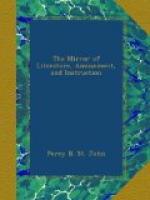XV.
And for the remnant which may be to come
I am content; and for the past I feel
Not thankless—for within the
crowded sum
Of struggles, happiness at times would
steal,
And for the present I would not benumb
My feelings farther.—Nor shall
I conceal,
That with all this I still can look around,
And worship Nature with a thought profound.
XVI.
For thee my own sweet sister, in thy heart
I know myself secure, as thou in mine;
We were and are—I am even as
thou art—
Beings who ne’er each other can
resign;
It is the same, together or apart,
From life’s commencement to its
slow decline
We are entwined—let death come
slow or fast,
The tie which bound the first endures
the last!
AMOUR AT VENICE.
Venice, November 17, 1816.
“I wrote to you from Verona the other day in my progress hither, which letter I hope you will receive. Some three years ago, or it may be more, I recollect you telling me that you had received a letter from our friend, Sam, dated “On board his gondola.” My gondola is, at this present, waiting for me on the canal; but I prefer writing to you in the house, it being autumn—and rather an English autumn than otherwise. It is my intention to remain at Venice during the winter, probably, as it has always been (next to the east) the greenest island of my imagination. It has not disappointed me; though its evident decay would, perhaps, have that effect upon others. But I have been familiar with ruins too long to dislike desolation. Besides, I have fallen in love, which, next to falling into the canal (which would be of no use, as I can swim,) is the best or the worst thing I could do. I have got some extremely good apartments in the house of a “Merchant of Venice,” who is a good deal occupied with business, and has a wife in her twenty-second year. Marianna (that is her name) is in her, appearance altogether like an antelope. She has the large, black, oriental eyes, with that peculiar expression in them, which is seen rarely among Europeans—even the Italians—and which many of the Turkish women give themselves by tinging the eyelid—an art not known out of that country, I believe. This expression she has naturally—and something more than this. In short, I cannot describe the effect of this kind of eye—at least upon me. Her features are regular, and rather aquiline—mouth small—skin clear and soft, with a kind of hectic colour—forehead remarkably good; her hair is of the dark gloss, curl, and colour of Lady J——’s; her figure is light and pretty, and she is a famous songstress—scientifically so; her natural voice (in conversation, I mean,) is very sweet; and the naivete of the Venetian dialect is always pleasing in the mouth of a woman.
November 23.
You will perceive that my description, which was proceeding with the minuteness of a passport, has been interrupted for several days. In the meantime.




